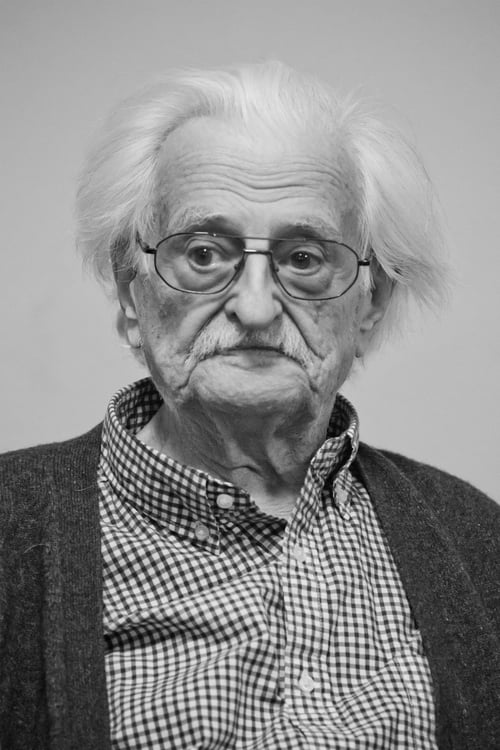
Marlen Khutsiyev
Nacimiento : 1925-10-04, Tiflis, Georgian SSR, Transcaucasian SFSR, USSR [now Tbilisi, Republic of Georgia]
Muerte : 2019-03-19
Historia
Marlen Martynovich Khutsiev (Russian: Марле́н Марты́нович Хуци́ев; 4 October 1925 – 19 March 2019) was a Georgian-born Soviet and Russian filmmaker best known for his cult films from the 1960s, which include I Am Twenty and July Rain. He was named a People's Artist of the USSR in 1986.
Khutsiev studied film in the directing department at the Gerasimov Institute of Cinematography (VGIK), graduating in 1952. He worked as a director at the Odessa film studio from 1952 to 1958, and worked full-time as a director at Mosfilm from 1965 onward.
Khutsiev's first feature film, Spring on Zarechnaya Street (1956), encapsulated the mood of the Khrushchev Thaw and went on to become one of the top box-office draws of the 1950s. Three years later, Khutsiev launched Vasily Shukshin "as a new kind of popular hero" by starring him in Two Fyodors. His two masterpieces of the 1960s, however, were panned by the authorities, forcing Khutsiev into something of an artistic silence. In 1978, Khutsiev began teaching film directing master classes at the VGIK.)
His 1991 film Infinitas won the Alfred Bauer Prize at the 42nd Berlin International Film Festival.

Self
After the release of "Nostalgia", Andrei Tarkovsky runs out his Soviet authorities permission to work abroad: he has to go back home. But he understands from the messages of some friends and colleagues that his life in Russia would be even tougher than before. So he then decides to break with Soviet authorities and, a year before the Milan Conference of 1984 during which he will announce publicly his decision, he leaves his friends that are hosting him in Rome and takes refuge in a secret location.

Himself / Narrator
In the world, there is a city-port Odessa, which was specially created as a refuge for people of different nationalities and religions. Humor is a special language that helps people from Odessa to communicate and get along with each other. Legends are spreading about Odessa's humor and accent. But - a paradox - people are constantly leaving it. It is loved, but it is left as a child leaves his mother. On the example of this city and its inhabitants, we wanted to understand - why people flee from their cities. We tried to find the answer taking pictures of Odessa citizens in Germany, Israel, Ukraine, Russia, Austria, France and other places. Michael Zhvanetskij, Roman Kartsev, Leonid Barats and Rostislav Khait Victor Loshak, Oksana Fandera, Valerij Todotovskij, Mikhail and Anatoly Kontush and many others are telling their stories and giving their opinions on what is the phenomenon of the city by the Black Sea.

Himself
To be somewhere precise yet stand nowhere at all, to embody one’s convictions, yet never miss the essential, to rise up and be present at the critical moment, to bear witness to a world waiting to tell itself and be retold, to come and go, both at once, abandoning reckless speed, but rather gently touching the human soul with images, with whispered words, the cracks in the wall of life: this is the choreography masterfully created in the film Beyond Territories, Valerie Osouf’s portrait of the world acclaimed filmmaker Abderrahmane Sissako.

Director
Made for the Venice Film Festival's 70th anniversary, seventy filmmakers made a short film between 60 and 90 seconds long on their interpretation of the future of cinema.

Self - Режиссер

Writer
The second World War echoes throughout the whole Khutsiyev's oeuvre. The director himself did not participate in the war: "The thing is, I didn't fight. I had been a sickly boy, so I was turned down because I still looked like a child. This is sort of like a debt I've been repaying ever since". In "People of 1941", Khutsiyev recites his favourite pieces by war poets and invokes documentary footage.

Director
The second World War echoes throughout the whole Khutsiyev's oeuvre. The director himself did not participate in the war: "The thing is, I didn't fight. I had been a sickly boy, so I was turned down because I still looked like a child. This is sort of like a debt I've been repaying ever since". In "People of 1941", Khutsiyev recites his favourite pieces by war poets and invokes documentary footage.

Screenplay
Fifty-year-old Vladimir Ivanovich Prokhorov, relieved of his worldly possessions, takes a journey back in time. Accompanied by a traveling companion barely half his age, he revisits the people and places of his youth and witnesses the dark forces that shaped the 20th century.

Director
Fifty-year-old Vladimir Ivanovich Prokhorov, relieved of his worldly possessions, takes a journey back in time. Accompanied by a traveling companion barely half his age, he revisits the people and places of his youth and witnesses the dark forces that shaped the 20th century.
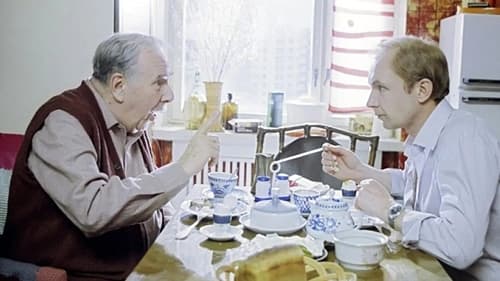
Writer
A young man is forced to spend a few days with his father in law...

Director
A young man is forced to spend a few days with his father in law...

Ramzes
About one day of a large mining family. In the center of the picture is a veteran, a former miner, and now a pensioner Panteleimon Dmitriyevich Grinin, who on Victory Day decided to introduce children to his “lady of the heart” hairdresser Zinaida. The action lasts only a day, but a lot happens during this time with the sons, daughters-in-law, daughter and Zinaida...

Director
Originally called World '68, later retitled The World of Today Romm’s film was conceived as an impassioned, large-scale essay on the origins of the 20th century and the subsequent reality the disappointed director felt slipping away from him. The film itself slipped away from him and was left unfinished at the time of his death. His younger colleagues, Marlen Khutsiev, Elem Klimov and German Lavrov, completed the film from the elements he left behind in addition to segments from Ordinary Fascism, closing the film with Romm’s ultimately optimistic outlook: "And still I believe that man is sensible..."

Author
Virtually unseen since its Soviet television broadcast in 1971, the film, Peter Rollberg writes, is “devoted to the anniversary of the Paris commune, mixing historical footage with images of present-day Paris.”

Director
Virtually unseen since its Soviet television broadcast in 1971, the film, Peter Rollberg writes, is “devoted to the anniversary of the Paris commune, mixing historical footage with images of present-day Paris.”

Director
Unos soldados soviéticos son emplazados en una granja de alemanes en los días en que se va a firmar la rendición alemana en la Segunda Guerra Mundial. Los primeros momentos de relación de los soldados con la mujer de la granja son más que prometedores entre chistes, desencuentros con el idioma y bailes. Todo cambia dramáticamente cuando se ordena al regimiento que inspeccione un campo de concentración.

Third 'cuckoo' player (prince)
This late 60s Russian films is set in 1920, just 3 years after the October revolution. Folks had the choice between red and white, revolution and contra revolution. In that torn-apart-time, one man, the comedian Volodya, tries to mediate, not between different ideologies, but social life and art. While others just want to wash away their gloom, he reflects on the everyday sorrows and the role of art in that time of changes.

Командующий войсками Антанты
The movie is set during the last days of a foreign intervention against Soviet Russia. Police are searching everywhere for a Bolshevik named Brodsky but cannot find him. Meanwhile, a man named Michel Voronov serves as a teacher to a rich woman's son, Zhen'ka.
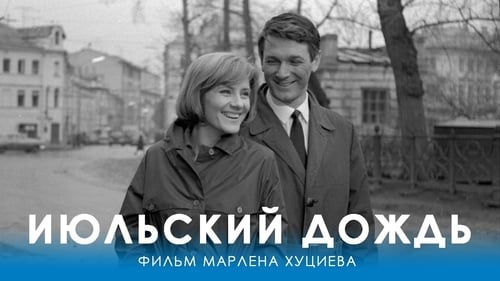
Writer
A woman is forced to examine the emptiness of her life in this stark drama from the Soviet Union. Lena (Yevgenya Uralova) is a woman in her late twenties who loves her boyfriend (Aleksandr Belyavsky) but in time comes to see that their relationship serves no useful function. What's more, she sees that her friends are for the most part empty-headed lackeys, causing her to wonder just what is the point of her life.

Director
A woman is forced to examine the emptiness of her life in this stark drama from the Soviet Union. Lena (Yevgenya Uralova) is a woman in her late twenties who loves her boyfriend (Aleksandr Belyavsky) but in time comes to see that their relationship serves no useful function. What's more, she sees that her friends are for the most part empty-headed lackeys, causing her to wonder just what is the point of her life.

Director
Three lifelong friends who return to Moscow after their military service and whose fathers have been killed in the war see their aspirations juxtaposed against everyday life in 1960s Soviet Union. They reflect on their possible futures and their place in society.
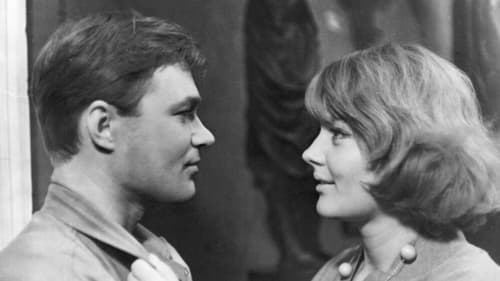
Writer
Having returned from the army, 20-year-old Sergei settles down at the thermal power station and merges into ordinary life. Every day he meets and spends time with childhood friends — the young family man Slava and the merry fellow Nikolai, and once at first sight he falls in love with a stranger on the bus. A lyrical story about a generation of young people entering adulthood, a reappraisal of values, life principles, traditions in culture and art.

Director
Having returned from the army, 20-year-old Sergei settles down at the thermal power station and merges into ordinary life. Every day he meets and spends time with childhood friends — the young family man Slava and the merry fellow Nikolai, and once at first sight he falls in love with a stranger on the bus. A lyrical story about a generation of young people entering adulthood, a reappraisal of values, life principles, traditions in culture and art.

Director
At the end of the Second World War, Fedor is demobilized and returns home where he meets a homeless boy, small Fedor. They decide to live together. The adult works in the building trade and the boy goes to school and looks after the house. They get on very well until Natacha arrives in big Fedor's life. After marrying big Fedor, Natacha tries to win the child's love. But he remains hostile.

Scenario Writer
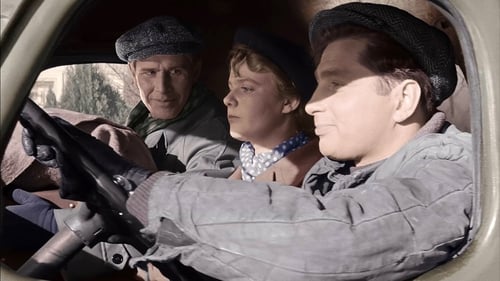
Director
Una sofisticada joven, idealista profesora de literatura rusa, llega a una ciudad provincial e industrial para dar clases a los jóvenes trabajadores de una fábrica de fundición de metal. Uno de sus alumnos más populares, arrogante y capaz de conseguir a cualquier chica, se enamora de ella, cuyos ideales chocan con los de él.
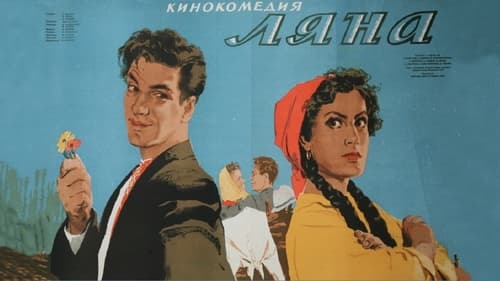
Assistant Director
A group of Moldavian folk musicians compete for the top Soviet prize. Singer Lyana loves the flautist, but he's fallen afoul of the group leader.














